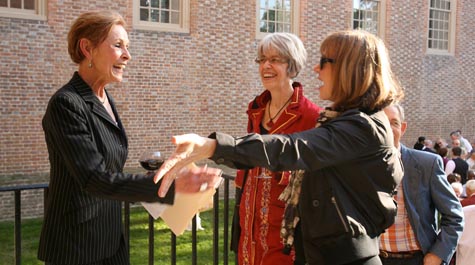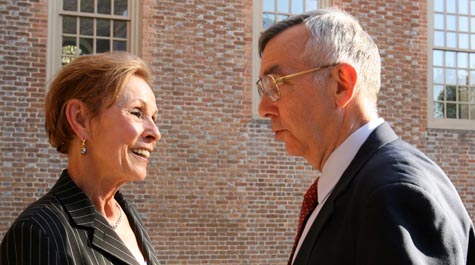W&M celebrates the career and contributions of Shirley Aceto
He was surprised when he later saw her walk into the Brafferton Building at William & Mary, the place where she would spend nearly four decades serving as much more than a fashionista; she was the backbone of the provost's office.
"After all this time, she's no less charismatic, she's no less classy and she's no less magical," he said.
Heacox, an associate professor of English, was one of hundreds of Aceto's admirers who came out to celebrate her decades of service to William & Mary during a reception for her in the Wren courtyard on April 29. Aceto will retire this summer after providing 115,000 hours of service to William & Mary as the first and only person to hold the position of assistant to the provost. During her tenure at the College, she served six provosts and five presidents, co-authored the revised faculty handbook, helped staff numerous faculty committees, worked as a liaison between the faculty and the administration, and served as one of the College's top go-to people for problem solving and institutional memory questions.
"People keep telling me that the College cannot go on without me, but of course it can and will. And I'm going to do my best to go on without it," Aceto said. "But I will miss the Brafferton. I will miss its people. I will miss being part of its purpose within this wonderful college."
William & Mary Provost Michael Halleran presented Aceto with several gifts at the reception and announced the establishment of the Shirley C. Aceto Award, which will be given annually to a member of the instructional or professional faculty "who demonstrates most fully a commitment to excellence in service for the common good."
"As you all know, Shirley's talents are many," said Halleran. "She is extremely smart, unimaginably knowledgeable. To modify the old phrase, she not only knows where all the bodies are buried, she knows who put them there and why. She is unquenchably upbeat, even in difficult times, remarkably creative in dealing with thorny situations, impeccable in her judgment, generous of her time and wisdom, and consistently graceful in all she does."
Halleran added that Shirley has touched thousands of people across the campus community every year.
"We seek her knowledge and her counsel, and we all know that the best way to get anything done on this campus is through Shirley," said Halleran.
President Taylor Reveley said he learned that lesson shortly after first arriving on campus in 1998 as dean of the William & Mary Law School.
"I soon learned that Shirley knew everyone at William & Mary, and I learned that she had a vast institutional memory," said Reveley. "And I found out that if you wanted to get something actually accomplished, especially something complicated or out-of-the-ordinary, Shirley was the person to see. Shirley was the go-to person at William & Mary with her great practical wisdom, her knowledge of how to chart a course through William & Mary's teeming decision-making processes and her willingness to make a decision, even if it was hard."
Reveley added, "To say that we will miss Shirley Aceto in the wheelhouse of the provost's ship hardly even begins to capture the reality of how much we will miss Shirley."
Celestine White and Ruth Hines, administrative specialists in the Provost's Office, said they still can't believe she's retiring.
"Shirley and I have worked together so long, it will seem like a part of me is leaving the Brafferton," said Hines. "She is the person who has taught me everything I know about academic affairs. Shirley's institutional knowledge is unparalleled. When people call the Provost's Office with a difficult question or situation, they know it will be resolved."
White came to work at the office during a difficult time in her life. She recalls Aceto telling her, "I wouldn't have hired you if you weren't qualified."
White said that comment "gave me back who I was and stuck with me throughout the years."
"She has been a delight to work for," said White.
Like Heacox, Colleen Kennedy, associate professor of English, noted Aceto's style.
"Even though one could praise for hours her style, her sophistication, her beauty and her grace, it's not Shirley the trendsetter that I want to acknowledge," she said.
Many faculty members - instructional and professional - don't know how profound a role Shirley plays in making sure they are represented, consulted, and "ensured due process," said Kennedy.
"I have seen enough administrators retire to know that Shirley has not been thanked enough," she said.
Kate Slevin, chancellor professor of sociology, said that she has come up with five "Aceto principles" after watching her in action for many years: 1) "Faculty are the lynchpin of the College and they should always be recognized as such and they should be treated with the utmost respect." 2) "Know the faculty handbook backward and forward and be able to cite it in your sleep." 3) "Consult the faculty." 4) "Consult the faculty." 5) "Consult the faculty."
"Shirley came to William & Mary and conquered all around her," said Slevin. "She set impossibly high standards for all of us and her legacy for dedication and commitment will be the stuff of College legend and lore."


















